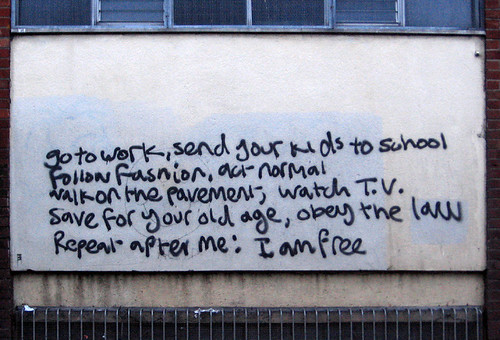Cindy Milstein,
Anarchism and Its Aspirations:
More than anyone, Karl Marx grasped the essential character of what would become a hegemonic social structure -- articulated most compellingly in his Capital (1867) as well as the earlier Economic and Philosophical Manuscripts of 1844. More than "simply" a form of economic exploitation dividing the world into a few haves and many have-nots ... capitalism's inherent grow-or-die logic would reconstitute the whole of life in its image. It "naturalized" values like competition and the domination of humans over other humans, as if they were normal conditions of life, like breathing, and made such values increasingly hegemonic.
This logic unfolds dialectically, as Marx shows, from the commodity, or "cell-form," of capitalism: an object no longer defined by how useful it is (use value), but by its exchangeability (exchange value). Rather than things having inherent worth in themselves, all of life becomes instrumentalized within a capitalist system. Capitalism is necessarily compelled to commodify more and more things, material and immaterial, affective and ecological -- the whole world, if possible. "Value" is determined by how much one has to exchange and accumulate: money, property, or especially power over others. This buy-sell relation, as Marx explained it, ultimately becomes masked in the commodity itself. Things-as-commodities -- from goods and human labor, to value systems and social structures -- seem to be ever-more independent of human creation. In this way, people become alienated, estranged, or seemingly removed from a world that is actually of their own making, and that could be remade in alternate, humane ways. As the Situationist International would later add, people become spectators rather than actors in their own lives -- lives that are increasingly controlled and deadening, if not deadly, regardless of whether one is "at work" or not.
I've often thought the point about "things not having value in themselves" was most ably mourned by your friend and mine, Holden Caulfield, when he remarked that, were he to play piano, he would play it in the goddam closet. "I wouldn't even
want them to clap for me. People always clap for the wrong things." In other words, perhaps there is value in doing something for its own sake, not always as a
means to something else.
For Marx, capitalism is a system of
profit production through the mass manufacture and exchange of
commodities. The purpose is to produce more capital, not necessarily more of any particular product. As you may have noticed, capitalism is happy to produce every sort of consumable garbage just as much as it will gladly discontinue genuinely useful items from a prior era.
Whether the commodity is an appliance, a vehicle, or some cultural product like a television show, the "use value" of a product is always a secondary consideration, subordinated to whatever production/exchange process will be most profitable. So refrigerators that last a lifetime are "updated" by models that last for several years, and reality TV shows displace almost every other kind of programming on television. Mostly disposable products from China, desired or not, flood the market because a very
special commodity, human labor power, can be bought more cheaply under a populous, authoritarian regime than it can in any of these United States.
The point, again, as it relates to Holden Caulfield and Karl Marx, is that there may be value in producing a thing for its
usefulness, not merely as a means to something else.





